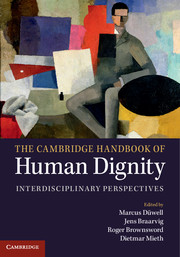Book contents
- Frontmatter
- Contents
- List of contributors
- Foreword
- Why a handbook on human dignity?
- Acknowledgments
- 1 Human dignity from a legal perspective
- 2 Human dignity: concepts, discussions, philosophical perspectives
- Part I Origins of the concept in European history
- Part II Beyond the scope of the European tradition
- Part III Systematic conceptualization
- 19 Social and cultural presuppositions for the use of the concept of human dignity
- 20 Is human dignity the ground of human rights?
- 21 Human dignity: can a historical foundation alone suffice? From Joas’ affirmative genealogy to Kierkegaard's leap of faith
- 22 Kantian perspectives on the rational basis of human dignity
- 23 Kantian dignity: a critique
- 24 Human dignity and human rights in Alan Gewirth's moral philosophy
- 25 Human dignity in the capability approach
- 26 Human dignity in Catholic thought
- 27 Jacques Maritain's personalist conception of human dignity
- 28 Scheler and human dignity
- 29 Dignity and the Other: dignity and the phenomenological tradition
- 30 Dignity, fragility, singularity in Paul Ricœur's ethics
- 31 Human dignity as universal nobility
- 32 Dignity in the ubuntu tradition
- 33 Posthuman dignity
- 34 Dignity as the right to have rights: human dignity in Hannah Arendt
- 35 Individual and collective dignity
- Part IV Legal implementation
- Part V Conflicts and violence
- Part VI Contexts of justice
- Part VII Biology and bioethics
- Appendix 1 Further reading
- Appendix 2 Universal Declaration of Human Rights
- Index
- References
22 - Kantian perspectives on the rational basis of human dignity
from Part III - Systematic conceptualization
Published online by Cambridge University Press: 05 March 2015
- Frontmatter
- Contents
- List of contributors
- Foreword
- Why a handbook on human dignity?
- Acknowledgments
- 1 Human dignity from a legal perspective
- 2 Human dignity: concepts, discussions, philosophical perspectives
- Part I Origins of the concept in European history
- Part II Beyond the scope of the European tradition
- Part III Systematic conceptualization
- 19 Social and cultural presuppositions for the use of the concept of human dignity
- 20 Is human dignity the ground of human rights?
- 21 Human dignity: can a historical foundation alone suffice? From Joas’ affirmative genealogy to Kierkegaard's leap of faith
- 22 Kantian perspectives on the rational basis of human dignity
- 23 Kantian dignity: a critique
- 24 Human dignity and human rights in Alan Gewirth's moral philosophy
- 25 Human dignity in the capability approach
- 26 Human dignity in Catholic thought
- 27 Jacques Maritain's personalist conception of human dignity
- 28 Scheler and human dignity
- 29 Dignity and the Other: dignity and the phenomenological tradition
- 30 Dignity, fragility, singularity in Paul Ricœur's ethics
- 31 Human dignity as universal nobility
- 32 Dignity in the ubuntu tradition
- 33 Posthuman dignity
- 34 Dignity as the right to have rights: human dignity in Hannah Arendt
- 35 Individual and collective dignity
- Part IV Legal implementation
- Part V Conflicts and violence
- Part VI Contexts of justice
- Part VII Biology and bioethics
- Appendix 1 Further reading
- Appendix 2 Universal Declaration of Human Rights
- Index
- References
Summary
Immanuel Kant (1724–1804) made the dignity of humanity central in his moral philosophy, and his idea has been interpreted and extended in many ways. Here, I sketch a broadly Kantian understanding of his position, noting occasionally alternative interpretations. The main questions are these: (1) What is human dignity? (2) By virtue of what do human beings have dignity? (3) Why believe in human dignity? (4) What are the practical implications?
Kant's main themes were these (Kant 2002: 214–45): all persons, regardless of rank or social class, have an equal intrinsic worth or dignity. Human dignity is an innate worth or status that we did not earn and cannot forfeit. Rather, we must strive to make our individual choices worthy of this moral standing, which elevates us above animals and mere things. A fundamental principle of reason and morality, the Categorical Imperative, tells us to treat humanity in each person never merely as a means, but always as an end in itself. We must act as if we were both law-makers and subjects in an ideal moral commonwealth in which the members, as ends in themselves, have dignity rather than mere price. In contrast to market price and other values that are dependent on our personal attachments, Kant calls dignity ‘an unconditional and incomparable worth’ that ‘admits of no equivalent’. Human dignity is based on the prior thesis that ‘the moral law’, an unconditional command of reason, has an absolute dignity and authority that everyone must respect. This moral law requires respect for human dignity because all human persons, good or bad, must, from the standpoint of practice, be presumed to have the capacities and predispositions of rational autonomy. In treating humanity as an end in itself and following the moral principles of an ideal moral commonwealth, we will be giving appropriate recognition to the autonomy of each person and shaping our lives by general policies that we can rationally regard as permissible for anyone to follow. The fundamental moral law that affirms human dignity has practical implications for both law and individual ethical choices. Legal institutions must interpret, apply and coercively enforce the innate right to freedom of every person, and individuals must respect themselves and others as persons with equal standing under the moral law.
- Type
- Chapter
- Information
- The Cambridge Handbook of Human DignityInterdisciplinary Perspectives, pp. 215 - 221Publisher: Cambridge University PressPrint publication year: 2014
References
- 16
- Cited by



